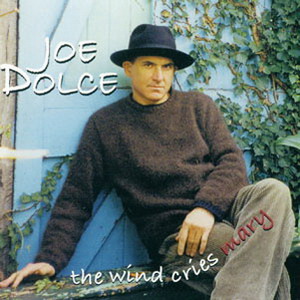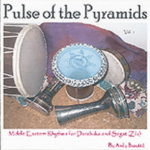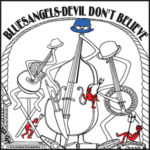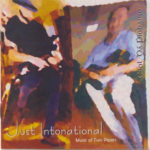Description
The album “The Wind Cries Mary” from Joe Dolce
Joe Dolce – The Wind Cries Mary
Review by Dai Woosnam
I once stayed in a hotel in France where on the back of the room door was a sign placed there by the management.
The sign said “Please refrain from cries of pleasure”.
I thought of that hotel (way back down the road) as I played this CD.
And figured that maybe Joe Dolce would have been wise to attach such a sticker to the jewel case of his CD.
But hey, stop a moment.
Who’d have thought that I would have ever written a short paragraph like that last one?
After all, I am old enough to remember when Joe Dolce achieved world fame, and thus came into my life.
That of course was in 1981, when his “Shaddap You Face” became a monster hit in most of the English-speaking world.
And I hated the song with a real intensity: the kind of intensity I don’t think I have managed to recapture in the quarter of a century since.
But not that Joe cared.
He just laughed his way to a thousand banks.
And then thankfully for me, as soon as he had entered my consciousness, he seemed to disappear just as quickly.
I heard nothing of him for the next two decades.
And then about five years ago, I came across his writing.
And I realised that this was a deeply serious man: and a bit of a Renaissance Man to boot.
But, though his writings may have impressed me, I still managed to avoid his recordings.
Until today, that is.
I opened this CD fearing the worst: was it going to present some sort of déjà vu that led my mind back to the execrable “Shaddup You Face”?
Well, no.
I need not have worried.
In the main it is a clear success: although one should add, a “qualified” one.
If you run a record store and wonder where to file it: I’d say file it under “eclectic”, or better still, put a copy of the CD in every one of your different sections.
Joe is joined by some fine musicians, and together they run the gamut of musical styles.
At first it appears that we are going to have a hard rock diet: the sort of rock that takes no prisoners.
Some phenomenally good percussion from Tony Floyd (a star throughout), helps drive the message home.
But by track four the mood has changed, and we have moved onto that favourite ballad of that fine sean nós singer, the late Joe Heaney: the “Rocks of Bawn”.
Now Joe (Dolce, not Heaney) slightly got my back up here.
The last verse used to always read:
I wish the queen of England would write to me in time,
And place me in some regiment all in my youth and prime;
I’d fight for Ireland’s glory from clear daylight till the dawn,
And I never would return again to plough the rocks of bawn.
To put that in its context, one needs to know that the “rocks of bawn” refers to the white rocks of the far west of Ireland (bawn is Gaelic for white).
And this is where many Catholic landowners were forced to go by Cromwell, when deprived of their own fertile farm land further east.
And here is the key to that closing verse: by offering to fight for the British Army – since trying to farm rocky infertile ground was an unequal battle – the singer of the song could see it was the only escape from attempting to achieve the impossible, viz. “plough the rocks of bawn.” It is not a pro-war song under Heaney: quite the opposite.
“Taking up arms” is seen as the only way of surviving.
But what does Joe Dolce do?
Crucially changes the first line of the last verse and deletes “Queen of England” and sings
I wish some sergeant major would send for me in time
By doing this of course, he turns it into an overt Rebel Song, instead of the highly subtle covert one it may have been! (The subtext under the Dolce version is, let’s fight for Ireland’s revenge because the English have reduced us to this hard life of poverty.)
True, Joe D does say in his very well produced and literate liner notes, that Heaney does a “slightly different lyric variation”. Eh?
“Slightly”? Ha!
Fairly crucial difference, I‘d say.
A ballad that is “war neutral” becomes “pro-war”, by that simple change of line.
Track five sees me notice Lin Van Hek’s delicious harmony vocals.
Lin is the long-time partner and best friend of Joe Dolce.
But it took track six to really get me sitting up and taking notice bigtime, with his truly marvellous evocation of the days when John and Yoko had their “Lie-in for Peace” in that hotel room in the Amsterdam Hilton.
Very clever musical references here to various Beatles’ songs (“Eleanor Rigby”, “Revolution 9” are two that I spotted).
However track seven saw him take a step backwards (after two forwards), and succeed in rubbing me up the wrong way with “Smokin”, a full-frontal attack on smokers.
A well-crafted song, but an “easy target” methinks.
Why not get after boozers Joe?
The truth is that they do so much more damage to other people.
Track eight, “Hill of Death”, reminds me that the great Henry Lawson had a mother who was a good poet in her own right.
But track 10 also reminds us that the Australian artistic conveyor belt still produces poets of note.
Keith McEnry’s fine words to “September 11th” really resonated with me, and this song about the murder of Salvador Allende (that could well have come from the pen of Victor Jara), abruptly stops with the 1973 date of the Chilean coup: September 11th.
It made my mouth go suddenly dry.
I had not until that point noticed that it shared the same day/month with a 2001 event that was also going to bring untold misery to a country: just as America had been behind the Pinochet coup, so a thirst for revenge from America saw them outdoing any horrors in Iraq that the one-time CIA thug Saddam Hussein could ever have conjured-up.
Tracks ten to twelve are the artistic high point of the album.
Track eleven, the Jimmie Hendrix title track, is delivered with tremendous brio, with Lin Van Hek showing that if Bonnie Raitt ever loses her voice, then Lin can sit in for her.
Gorgeous, trippy lead guitar from Joe brings the piece to an end.
And then we come to my favourite cut.
It is what Joe calls “Death of Bach”.
I nearly said “his” death of Bach.
But in truth, seeing as Bach melodies e.g. “Jesu, Joy of Man’s Desiring” make up a chunk of the track, the least Joe could have done is shown it as “Bach-Dolce” (instead of simply “Dolce”) in his liner notes!
But that’s a cheap shot from me perhaps.
However it remains my favourite track because there is something gloriously sincere about it. And nothing disingenuous.
Pure hero worship.
And I have to say Joe, that you could not have picked a better hero.
JS Bach is one of mine too.
Especially when reincarnated by the late great Glenn Gould.
So there you have it.
A bit of a curate’s egg of an album, but real high spots that had me, if not crying out with pleasure, then at least, grinning with delight.




